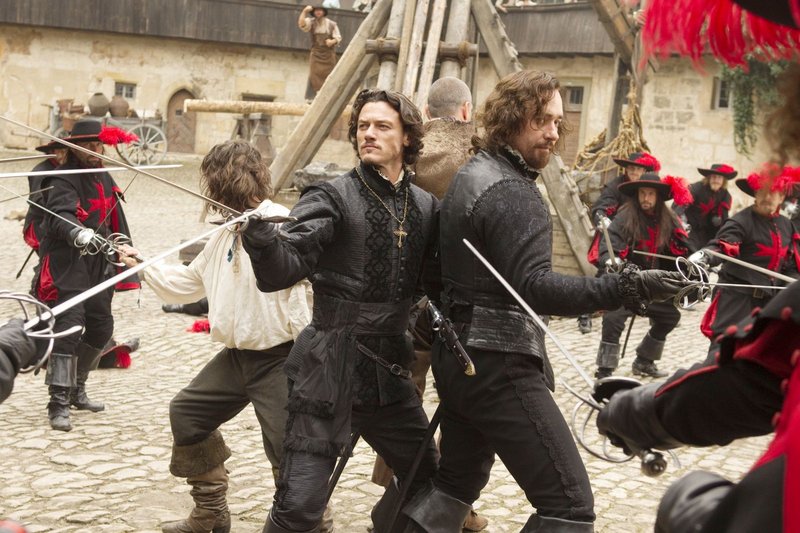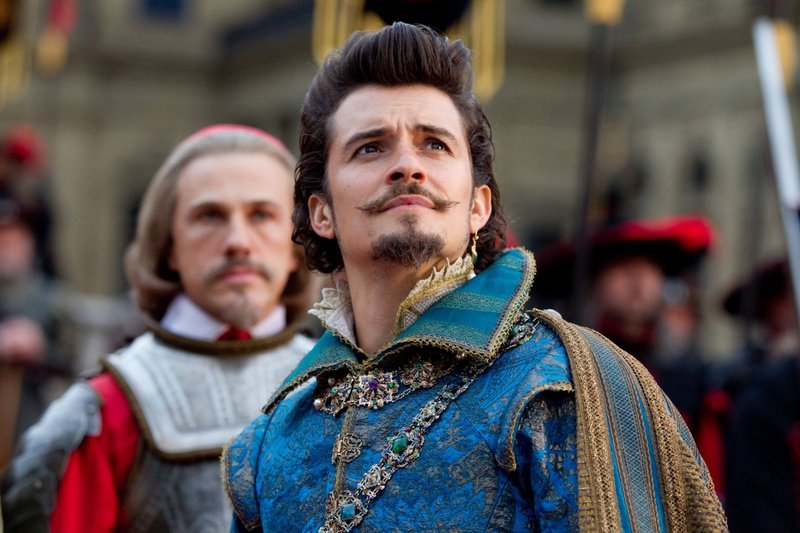Whatever your relationship (ardent, platonic, nonexistent) to the Alexander Dumas story about Athos, Porthos, Aramis and the lionhearted musketeer intern, D’Artagnan, there’s a word for the latest screen edition of “The Three Musketeers”: whatthehell?
Seriously: What the hell? Those who favored the callous aggravations of the recent Guy Ritchie-directed “Sherlock Holmes,” a film without which “The Three Musketeers” would be unthinkable, may forgive the grating, chaotic brand of storytelling and filmmaking here more easily than I. The director, Paul W.S. Anderson, brings to this costume party the same battering-ram sensibility he brought to “Alien Versus Predator,” “Death Race” (which I liked, actually) and the ongoing “Resident Evil” franchise. The 1844 Dumas adventure classic is now a steampunk’d migraine. Clashing swords — 3-D swords in your face! — purloined jewels and court intrigues no longer suffice. This movie couldn’t give a rip about that stuff. It exists for its digital airborne sailing vessels and deadly retro-futuristic flamethrowers.
Somewhere in there you’ll find a trio of cynical, out-of-work musketeers, the casualties of “budget cuts,” as one of them notes early on. “I thought you’d all be a little more … heroic,” says D’Artagnan, played by a haircut in search of an actor in search of a performance named Logan Lerman. Wrong movie! These three are homicide machines, or at least maiming machines, given to slow-motion gamer-style “kills.” No matter the clothes, the musketeers may as well be called The Dirty Quarter-Dozen.
Leonardo da Vinci, we learn, has drawn up plans for a deadly flying “war machine,” a combination of dirigible and seafaring galleon. In the prologue Athos (Matthew Macfadyen), Aramis (Luke Evans, the one most likely to be mistaken for Orlando Bloom, who plays the Duke of Buckingham) and Porthos (Ray Stevenson) sneak into Venice on a special-ops mission. Their accomplice, Milady de Winter, is played by Milla Jovovich, who is married to the director, which explains that. Soon she betrays the lot, allying herself with Cardinal Richelieu on the one hand and the Duke of Buckingham on the other. Christoph Waltz snivels as Richelieu while Bloom swans around and consistently lets the energy dribble away from his dialogue scenes. Not that director Anderson cares about dialogue. But he’s a numbskull with action.
Written by Alex Litvak, who wrote “Grayskull” and “Predators,” and Andrew Davies, who adapted “Pride and Prejudice” for British television, this horsey version plays as though any two people involved in the making of the picture failed to have a single conversation with any other two people. The score (straight out of Hans Zimmer’s “Sherlock Holmes” soundscape) keeps promising excitement never conveyed by the on-screen activity.
Lerman already has done solid work in films such as “3:10 to Yuma” and the first “Percy Jackson” film, but he’s a blank slate here. As Rochefort, a role beefed up for this latest film version, the splendid Mads Mikkelsen has a flash or two of menace, even if his English is less than fluid. But the action is so dominated by green-screen effects and bombastic nonsense, you long for a decently paced, shrewdly edited sword fight or two.
Rewatch the 1974 Richard Lester “Three Musketeers” sometime. That impudent entertainment, both plush and merrily slapdash, had little to do with Dumas, but it had a spark to call its own. This latest version is “le pits.”
Send questions/comments to the editors.



